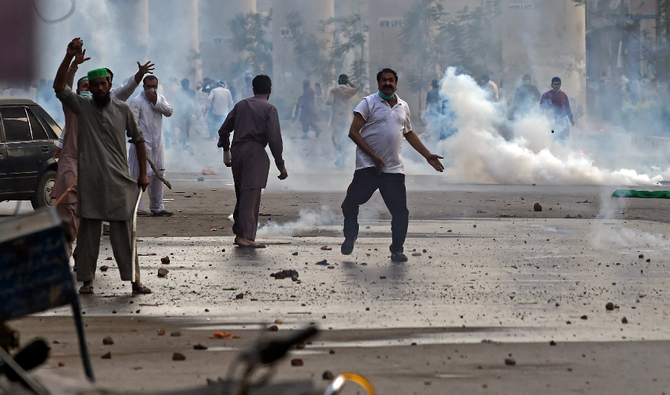ISLAMABAD: A religious political party, the Tehreek-e-Labaik Pakistan (TLP), said on Tuesday 20 of its supporters had been killed and dozens injured in clashes with police and paramilitary soldiers during nationwide protests against the arrest of the party’s top leader Saad Rizvi.
A senior government advisor, however, told Arab News the ruling Pakistan Tehreek-e-Insaf (PTI) government wanted a peaceful resolution of the issue.
Rizvi was taken into custody on Monday in the eastern city of Lahore, a day after he threatened the government with protests if it did not expel France’s envoy to Islamabad over blasphemous caricatures of Prophet Muhammad (peace be upon him).
“The peaceful protest is their [TLP’s] right, but there must be no violence and hindrance to public movement due to the demonstrations,” Hafiz Tahir Mehmood Ashrafi, special representative of Prime Minister Imran Khan on religious harmony, told Arab News on Tuesday.
He said the prime minister had “effectively raised” the issue of Islamophobia on all international platforms including the United Nations.
“We should all endeavor for the unity of Muslims and religious harmony and peaceful coexistence in the country,” he added.
Protests erupted in major Pakistani cities soon after the TLP leader was arrested, causing massive traffic snarls, while main intercity highways remained blocked.
In a voice message sent to Arab News, the TLP media coordinator Arslan Tassaduq said at least 20 people had been killed in firing by authorities.
“Our supporters have been shot,” he said. “More than 20 of TLP’s supporters have been shot and they have been martyred.”
Arab News could not independently verify the figures.
“You will have to expel the French ambassador under all costs,” TLP said in a statement released on Tuesday afternoon. “The country will remain jammed until the French ambassador is expelled.”
In a separate statement, TLP said its protests would go on until Rizvi was released and gave the orders.
Meanwhile, protests continued in cities across the country for a second day.
“All main cities like Lahore, Gujranwala, Islamabad and Peshawar were cut off from each other and the rest of the country,” Pakistan’s Dawn newspaper reported. “The activists held sit-ins at various points in Hyderabad and Sukkur. They blocked highways, motorways and train tracks, disrupting life ... and causing violence as protesters clashed with police at many places.”
Pakistani media reported that at least 100 TLP supporters had been arrested on Monday night, while police said dozens of officers had been injured by protesters.
“By 10pm, the blockage assumed another dimension when both the Punjab minister and secretary of specialized health care started warning that hospitals were running out of oxygen,” Dawn reported, quoting Punjab health minister Dr. Yasmin Rashid as saying: “The supply is made every eight hours and all critical COVID-19 patients need fresh supplies, which cannot be made because all major arteries of the city are blocked. The crisis situation could quickly assume disaster proportions if supplies are not immediately restored.”
Rizvi has called on the government to honor what he said was a commitment it made in February to his party to expel the French envoy before April 20 over the publication in France of depictions of the Prophet (pbuh).
The government of Prime Minister Imran Khan says it had only committed to debating the matter in Parliament.
Rizvi became the leader of the Tehreek-e-Labiak Pakistan party in November after the sudden death of his father, Khadim Hussein Rizvi. His party wants the government to boycott French products and expel the French ambassador under an agreement signed by the government with Rizvi’s party in February.
Tehreek-e-Labiak and other religious parties denounced French President Emmanuel Macron since October last year, saying he tried to defend caricatures of the Prophet Muhammad (pbuh) as freedom of expression.
Macron’s comments came after a young Muslim beheaded a French school teacher who had shown caricatures of the Prophet Muhammad (pbuh) in class. The images had been republished by the satirical magazine Charlie Hebdo to mark the opening of the trial over the deadly 2015 attack against the publication for the original caricatures. That enraged many Muslims in Pakistan and elsewhere who believe those depictions are blasphemous.
Rizvi’s party gained prominence in Pakistan’s 2018 federal elections, campaigning to defend the country’s blasphemy law, which calls for the death penalty for anyone who insults Islam. It also has a history of staging protests and sit-ins to pressure the government to accept its demands.
In November 2017, Rizvi’s followers staged a 21-day protest and sit-in after a reference to the sanctity of the Prophet Muhammad (pbuh) was removed from the text of a government form.
















